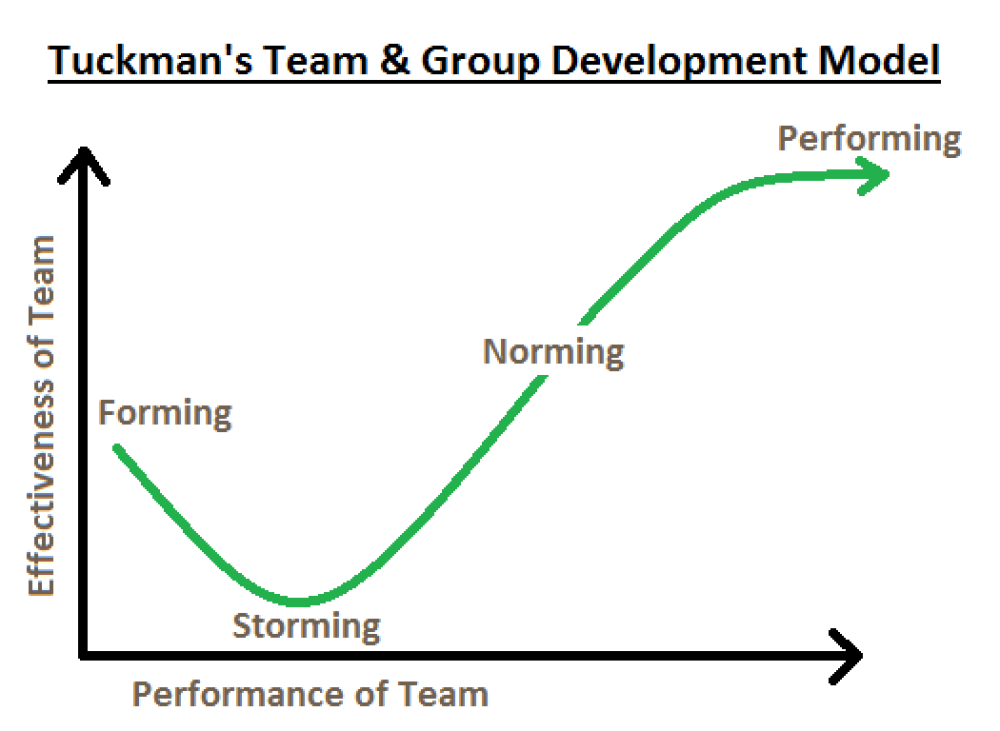These are known as tuckman stages. Forming, storming, norming, performing, and adjourning.
Diagram Bruce Tuckman Culture at Work
These are forming, storming, norming, and performing.

Forming norming storming and performing model. This article aims to explain tuckman’s forming, storming, norming, and performing model of group development. According to bruce tuckman, team development has five stages: Similarities can be seen with other models, such as tannenbaum and schmidt continuum and especially with hersey and blanchard's situational leadership® model, developed about the same time.
It is one of the more known team development theories and has formed the basis of many further ideas since its conception. The concept of forming, storming, norming and performing (fsnp) describes the four stages of psychological development a team goes through as they work on a project. Forming a team takes time, and members often go through recognizable stages as they change from being a collection of.
3 moving between the stages. The most common is that teams go through a series of different levels before effectiveness is achieved. 2 using the forming storming norming and performing stage for team development.
In a 1965 article in the psychological bulletin, bruce tuckman introduced a team and group development model that maps a team’s. Let’s discuss the stages of team formation and the role of the project manager. In 1965, bruce tuckman identified four stages of development — forming, storming, norming and performing — that every team experiences.
Forming, storming, norming, and performing model describes these stages. By understanding it, you can help your team to become productive more quickly. Much like individuals grow and develop over time, so does a team.
The idea originated in 1965 with american. This mindtools talk explains psychologist bruce tuckman's forming, storming, norming, and performing model that gives you a great way to understand team dy. 1.the tuckman model, 2.the standard team model, 3.moore's team framework, 4.the siebert model
Bruce tuckman's forming, storming, norming, and performing model describes these stages. The forming, storming, norming, and performing model describes these stages. The model was developed in 1965 by bruce tuckman, an american psychologist.
2.1 look at the current status of your team. In 1977, tuckman, jointly with mary ann jensen, added a fifth stage to the four stages: Forming a team takes time, and members often go through recognizable stages as they change from being a collection of strangers to a united group with common goals.
Team members behave differently in each stage, and the project manager must act accordingly to help them develop. Psychologist bruce tuckman first identified four stages of team formation in the mid sixties. In 1965, bruce tuckman identified four stages of development — forming, storming, norming and performing — that every team experiences.
2.2 take steps to help them move forward. This model was first developed by bruce tuckman in 1965. In tuckman’s early professional career, he worked with a small group of social psychologists at the naval.
In 1977, tuckman, jointly with mary ann jensen, added a. In the forming stage, most team members are positive and polite, but some of them might feel. They describe the process teams go through as people form bonds and learn to work together effectively.
The tuckman model describes the phases that groups of individuals go through when they first begin working together as a team. In the first phase, forming, teams are uncertain about the team goals and how to work together.in the second phase, storming, teams challenge boundaries and get to know each other and how to work together.in the norming phase, teams. It is also widely known as tuckman’s stages of group development.
The us navy tasked him, along with a group of other social psychologists, with analysing the dynamics of forming a team, and how the leadership style changes as the group develops. Teams move through each stage as they overcome challenges, learn to work together and eventually focus on accomplishing a shared goal. Psychologist researcher bruce tuckman formed tuckman's model as part of his 1965 paper developmental sequence in small groups.
When you understand it, you can help your new team become effective more quickly. The 'forming, storming, norming, performing' theory is an elegant and helpful explanation of team development and behaviour. Both of these theories and how.
Tuckman's theory focuses on the way in which a team tackles a task from the initial formation of the team through to the. Introducing tuckman's model psychologist bruce tuckman first came up with the memorable phrase, “forming, storming, norming, and performing” in 1965.

Stages of Agile Squad Development Forming, Storming, Norming

Forming Storming Norming Performing Team development, Change

Forming, storming, norming & performing how a team develops
Step 2 Forming Storming Norming & Performing Weathering the Storms

Premijer Orešković uzda se u graf Brucea Tuckmana, evo što on znači